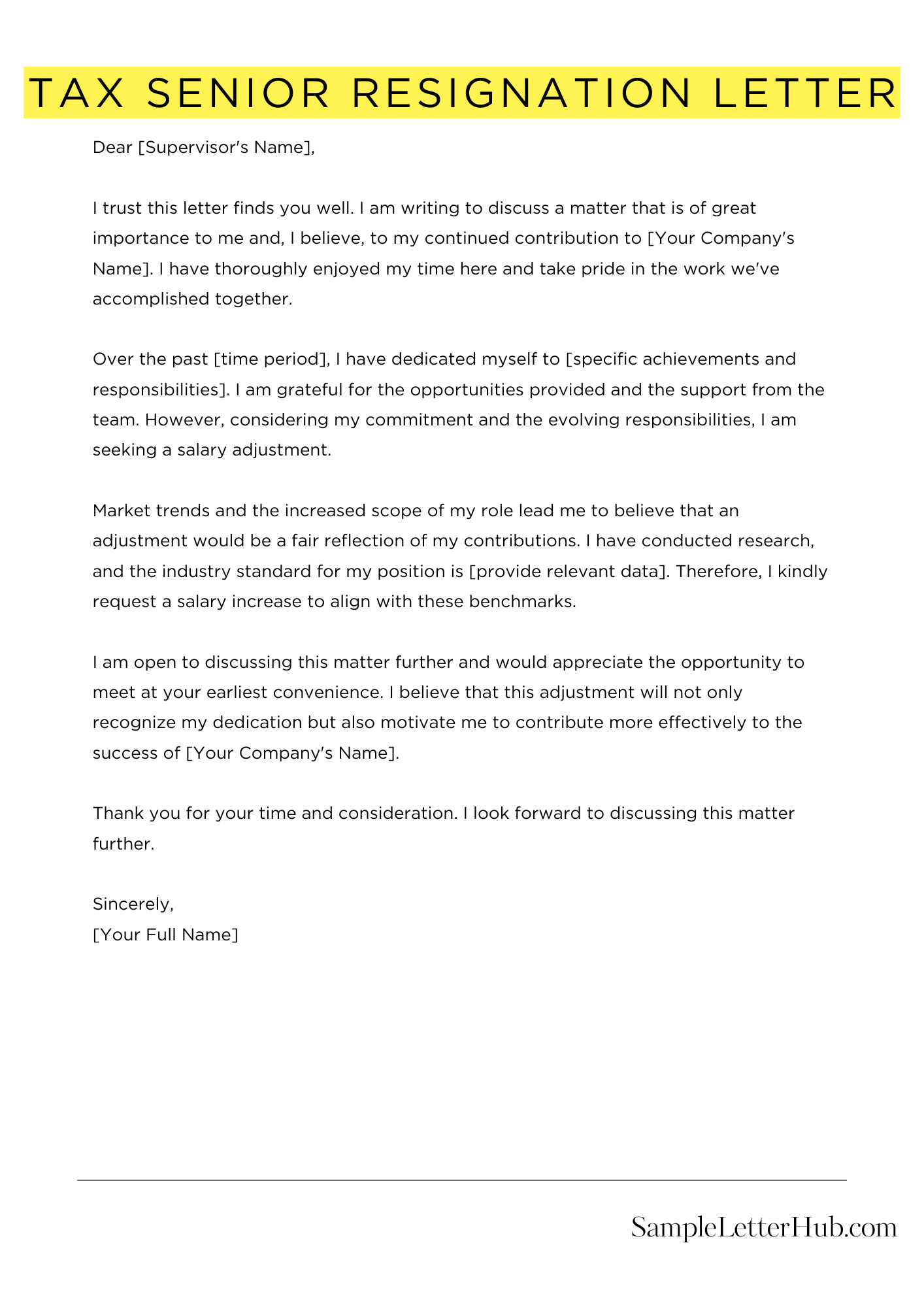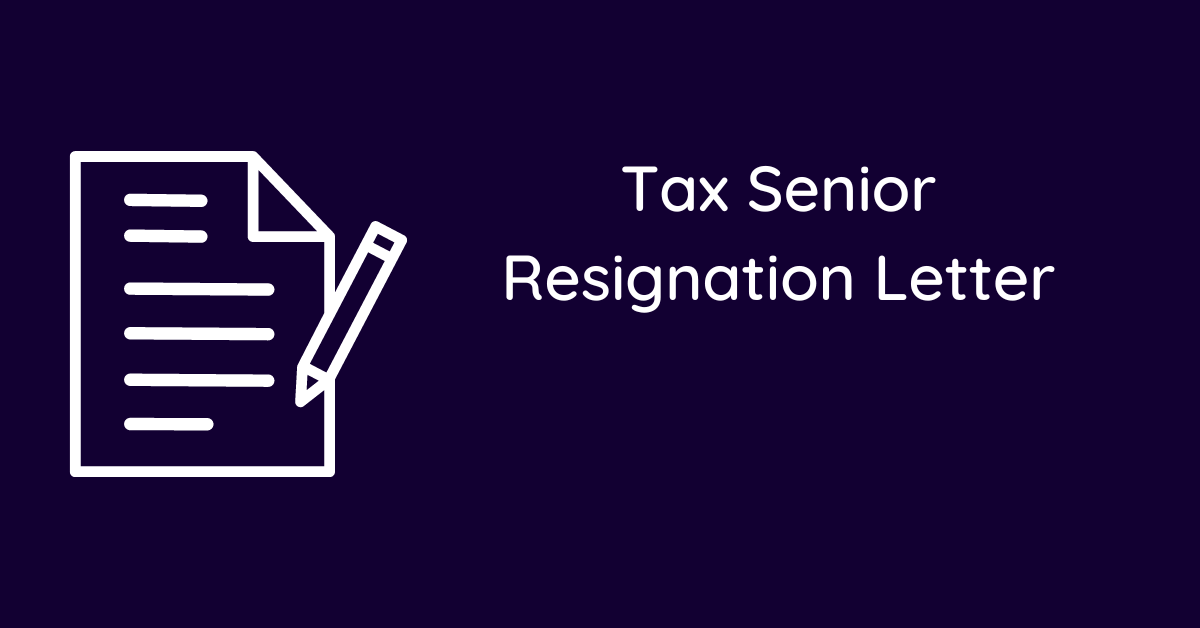If you’re a tax senior looking to move on to new challenges, writing a clear and professional resignation letter is essential. It’s a chance to express your gratitude for the opportunities you’ve been given and to leave a positive impression on your colleagues.
In your letter, be polite and humble. Thank your manager for their support and guidance, and express your appreciation for the experience you’ve gained. Be clear about your decision to leave, and state your last date of employment. You can also mention any plans you have for the future, but keep it brief.
Below, we’ve included a template tax senior resignation letter that you can use as a starting point. Feel free to adapt it to your own circumstances.
Tax Senior Resignation Letter
Dear [Recipient Name],
Please accept this letter as formal notification that I will be resigning from my position as Tax Senior at [Company Name], effective [Last Day of Employment].
During my tenure at [Company Name], I have gained invaluable experience and developed strong relationships with my colleagues. I am grateful for the opportunities and support I have received.
I wish you and [Company Name] all the best in the future.
Sincerely,
[Your Signature]
Short Tax Senior Resignation Letter Sample
Please accept this letter as formal notification that I am resigning from my position as Tax Senior at [Company Name]. My last day of employment will be [Your Last Day]. Thank you for the opportunity to grow and learn during my time here. I wish you and the company continued success. I am happy to assist in the transition process to ensure a smooth handover of my responsibilities.
I wish you all the best with your tax senior resignation letter.
When it’s time to say farewell, expressing your gratitude and best wishes can make the transition smoother:

How to Write a Tax Senior Resignation Letter
1. Express Gratitude and Appreciation
Begin by expressing your sincere gratitude for the opportunities and experiences you’ve gained during your time with the company. Highlight specific projects or accomplishments that you’re particularly proud of, and thank your colleagues and supervisors for their support and guidance.
2. State Your Resignation Clearly
In the second paragraph, clearly state your intention to resign from your position as Tax Senior. Include your last date of employment and offer to assist with the transition in any way possible.
3. Explain Your Reasons (Optional)
If you feel comfortable, you can briefly explain your reasons for leaving. Be professional and respectful, and avoid any negative or critical comments about the company or your colleagues. Focus on your personal goals and aspirations, such as seeking new challenges or pursuing further education.
4. Offer to Help with the Transition
Reassure your employer that you’re committed to ensuring a smooth transition during your notice period. Offer to train your replacement, document your responsibilities, and provide any other necessary assistance.
5. End with a Positive Note
Conclude your letter with a positive and professional tone. Reiterate your appreciation for the company and your colleagues, and wish them well in the future.
Tax Senior Resignation Letter: 6 FAQs
Resigning from a position can be a daunting task, especially when it comes to a specialized role like that of a Tax Senior. Here are six frequently asked questions and answers to help you navigate this process:
1. How do I write a compelling resignation letter?
Your resignation letter should be concise, professional, and express your gratitude for the opportunity to work at the company. Clearly state your last date of employment and offer to assist in the transition process.
2. What should I include in my resignation letter?
Include your name, position, last date of employment, and a brief statement expressing your gratitude for the experience. You can also mention any specific projects or accomplishments you’re proud of.
3. How much notice should I give?
The standard notice period is two weeks, but it’s always advisable to give as much notice as possible to allow for a smooth transition.
4. Should I offer to help train my replacement?
Yes, offering to help train your replacement shows professionalism and a commitment to ensuring a seamless handover.
5. Can I negotiate my end date?
In some cases, you may be able to negotiate your end date if you have a pressing reason, such as a new job offer or a relocation.
6. What should I do if I’m feeling emotional about leaving?
It’s natural to feel emotional when leaving a job, but try to remain professional in your resignation letter. If you’re struggling to write it, consider asking a colleague or mentor for assistance.
Before making the decision to resign from your job, it’s essential to consider the legal aspects:
Understanding your emotions after quitting your job is important. Explore why you might be feeling sad:
Related
- Resignation letter sample
- Forced resignation letter
- Resignation letter due to going abroad
- Resignation letter due to marriage
- Resignation letter due to other opportunity
- Resignation letter due to mistake

